Dear Hiveans,
I often read and hear that inflation will hit this year, that "inflation expectations" are increasing, that commodities increase in price and that the economy will rebound strongly (e.g. cnbc or businessinsider).
I doubt that. 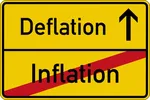
During the great financial crisis 2007-'09 (GFC), many journalists compared it to the Great Depression (1929-'41). Today, we know that the immediate consequences of the GFC weren't nearly as bad as the Great Depression.
I would rather compare the GFC with World War I, in the way both "events" led to exploding national debt (see charts below, example UK).
Wars and financial crises lead to skyrocketing (mostly sovereign) debt 🚀. This increase of debt is by itself (short-term) inflationary because the money supply is increased via credit (https://www.investopedia.com/terms/c/credit-money.asp).
In the long run no borrower can extend and increase his debts infinitely. Debt must come down.
There are 2 possibilities for that: the borrower defaults and his debt is written off, or the borrower pays down his debt (at least partially). Both possibilities are deflationary because the money supply goes down.
How would deflation arise?
If at a certain point in time there is a sudden panic, e.g. because of a bank failure, then the everything bubble will burst. This is accompanied by a deflationary shock / credit crunch / dollar crunch / deflationary spiral: Due to the greater (perceived) risk, the (implicit) interest rates increase, which increases the probability of default of loans and reduces the value of equities and real estate. The higher probability of default on loans and also the actual default of loans reduce the money supply abruptly (= deflation). Since the money supply is now lower, companies find it even more difficult to pay their loans; i.e. the interest rates rise further, whereupon the money supply falls even further (vicious cycle). People/companies liquidate their stocks/real estate and, if they can, pay back their loans. This also reduces the money supply. In order to sell anything at all, companies have to reduce their prices (=deflation). Without intervention by monetary charlatans policymakers, this (healing) process would continue until the debt ratio is manageable, the risk and thus the interest rates in the market are low enough again, that entrepreneurs would be willing to borrow money and start companies or hire employees again.
In the case of the Great Depression the Dow Jones dropped 89%:
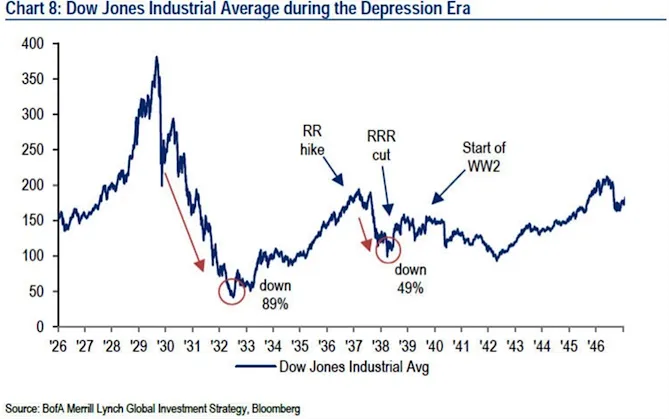 source
source
Today that is impossible, of course (or is it?). I think that's highly unlikely due to many factors (e.g. the debt expansion today isn't as bad and the financial markets have evolved).
I often hear that debt is inflationary. I think that's wrong because debt leads to demand for dollars. Demography is deflationary, too, as the baby boomers (the biggest and richest generation cohort in most societies) are retiring en masse. Retired people consume less, sell their stocks and try to pay down their debt (mortgage, etc.). That's deflationary.
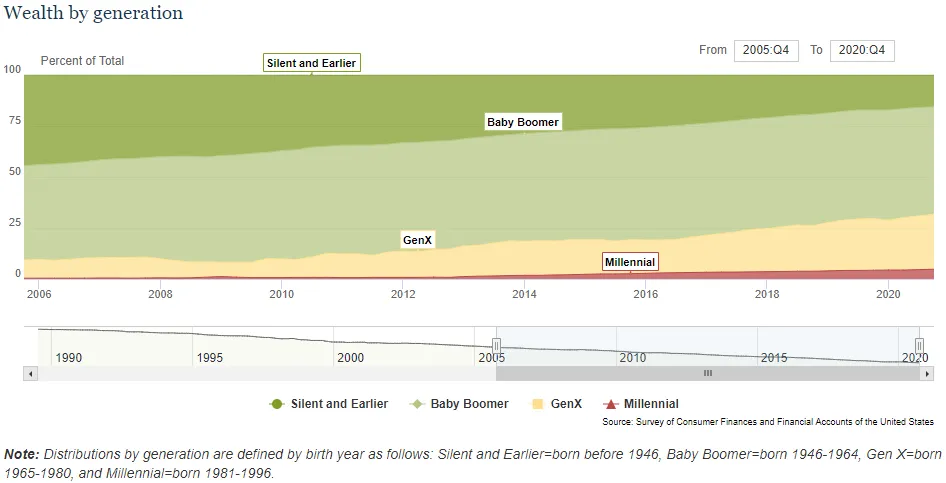
source: Fed (This graphic alone is a time bomb...)
To put it in a nutshell: In a shorter term (<5 years) I expect waves of deflation accompanied by company and bank failures. Central banks and governments will try to stop deflation, but won't be very successful. Some smaller and economically weaker countries will go too far and push their currencies into hyperinflation. At a certain point in the future (3-7 years from now) I expect risk appetite to increase again and higher inflation to gain momentum.
My personal investment approach in this macro environment is rather simple:
- My main holdings are BTC and gold (rather long inflation, but also relatively robust to deflation); plus, I hold the fiat amount I need for 6 months, 50% in USD and CHF (rather long deflation). And, of course, my dearest and my only risky asset: Hive 😍.
- Currently I don't hold stocks because I consider them wildly overvalued and I expect company earnings to go down a lot.
- Since last autumn, I regularly buy some put options on the S&P500, and call options on 30 years US treasuries. This is my protection against deflation.
Further reading/watching (if you have much time 😉):
Why QE is NOT inflationary: https://alhambrapartners.com/2020/09/21/ok-bank-reserves-lets-do-this-one-more-time/
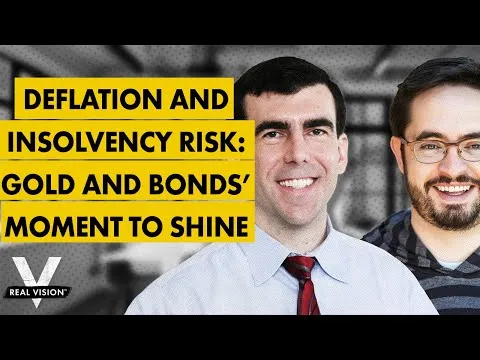
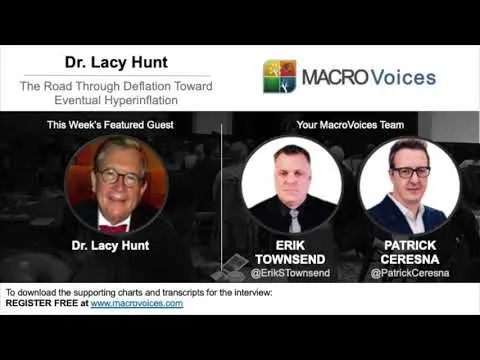
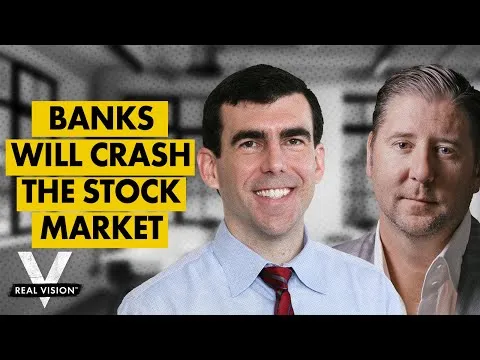
I‘m looking forward to your critical comments and hopefully controversial opinions 😀.
But always remember: this is Hive and we debate politely and have a great culture of debate. This is Hive, not Facebook.
Liebe Hiver,
Ich lese und höre oft, dass die Inflation in diesem Jahr anziehen wird, dass die "Inflationserwartungen" und Rohstoffpreise steigen und dass die Wirtschaft stark anziehen wird (cnbc oder businessinsider).
Ich bezweifle das.
Während der großen Finanzkrise 2007-'09 (GFC) verglichen viele Journalisten diese mit der Großen Depression (1929-'41). Heute wissen wir, dass die unmittelbaren Folgen der GFC nicht annähernd so schlimm waren wie die der Großen Depression.
Ich würde die GFC eher mit dem Ersten Weltkrieg vergleichen, da beide "Events" zu einer explodierenden Staatsverschuldung führten (siehe Grafiken unten, Beispiel UK).
Kriege und Finanzkrisen führen zu explodierenden (Staats-)Schulden 🚀. Dieser Anstieg der Verschuldung ist an sich (kurzfristig) inflationär, weil die Geldmenge über Kredite erhöht wird (https://www.investopedia.com/terms/c/credit-money.asp). Langfristig kann kein Kreditnehmer seine Schulden unendlich verlängern und erhöhen. Die Verschuldung muss sinken.
Dafür gibt es 2 Möglichkeiten: der Kreditnehmer wird zahlungsunfähig und seine Schulden werden abgeschrieben, oder der Kreditnehmer zahlt seine Schulden (zumindest teilweise) zurück. Beide Möglichkeiten sind deflationär, weil die Geldmenge sinkt.
Wie würde eine Deflation entstehen?
Wenn zu einem bestimmten Zeitpunkt plötzlich eine Panik auftritt, z.B. wegen einer Bankenpleite, dann platzt die "everything bubble". Es folgt der Deflationsschock / Credit Crunch / Dollar Crunch / Deflationsspirale: Aufgrund des grösseren (wahrgenommenen) Risikos steigt der (implizite) Zinssatz, was die Kreditausfallwahrscheinlichkeit erhöht und den Wert von Aktien und Immobilien reduziert. Die höhere Kreditausfallwahrscheinlichkeit und auch der tatsächliche Kreditausfall reduzieren die Geldmenge ruckartig (= Deflation). Da die Geldmenge nun niedriger ist, fällt es Unternehmen noch schwerer ihre Kredite zu bezahlen; d.h. der Zins steigt weiter, woraufhin die Geldmenge noch weiter fällt (Teufelskreis). Personen/Unternehmen liquidieren ihre Aktien/Immobilien und zahlen - wenn sie können - ihre Kredite zurück. Auch das reduziert die Geldmenge. Um überhaupt noch was verkaufen zu können, müssen Unternehmen ihre Preise reduzieren (=Deflation). Ohne Eingriff von Scharlatanen Geldpolitikern würde dieser (Heilungs-)Prozess so lange laufen, bis die Schuldenquote überschaubar ist, das Risiko und damit der Zins im Markt wieder niedrig genug ist, dass Unternehmer wieder bereit sind, Geld aufzunehmen und Firmen zu gründen oder Mitarbeiter einzustellen.
Im Fall der Großen Depression fiel der Dow Jones um 89%:
 Quelle
Quelle
Heute ist das natürlich unmöglich (oder etwa nicht?). Ich halte das aufgrund vieler Faktoren für sehr unwahrscheinlich (z.B. ist die Schuldenexpansion heute nicht so schlimm und die Finanzmärkte haben sich weiterentwickelt).
Ich höre oft, dass Schulden inflationär sind. Ich denke, das ist falsch, denn Schulden führen zu vermehrter Nachfrage nach Dollar. Auch die Demografie ist deflationär, da die Babyboomer (die größte und reichste Generation in den westlichen Gesellschaften) massenhaft in Rente gehen. Menschen im Ruhestand konsumieren weniger, verkaufen Aktien und versuchen, ihre Schulden (Hypotheken etc.) abzutragen. Das ist deflationär.

source: Fed (Diese Graphik ist eine Zeitbombe)
Kurzgefasst: Auf kürzere Sicht (<5 Jahre) erwarte ich Deflationswellen, begleitet von Firmen- und Bankenpleiten. Zentralbanken und Regierungen werden versuchen, die Deflation zu stoppen, aber sie werden nicht sehr erfolgreich sein. Einige kleinere und wirtschaftlich schwächere Länder werden zu weit gehen und ihre Währungen in die Hyperinflation treiben. Zu einem bestimmten Zeitpunkt in der Zukunft (in 3-7 Jahren) erwarte ich, dass die Risikobereitschaft wieder zunimmt und eine höhere Inflation in Gang kommt.
Mein persönlicher Investmentansatz in diesem Makroumfeld ist recht einfach:
- Ich halte hauptsächlich BTC und Gold (eher long inflation, aber auch relativ robust gegenüber Deflation); außerdem halte ich den Fiat-Betrag, den ich für 6 Monate brauche, zu 50% in USD und CHF (eher long deflation). Und natürlich mein Favorit und einziges riskantes Investment: Hive 😍.
- Derzeit halte ich keine Aktien, weil ich sie für stark überbewertet halte und ich erwarte, dass die Unternehmensgewinne stark sinken werden.
- Seit letztem Herbst kaufe ich regelmäßig Put-Optionen auf den S&P500 und Call-Optionen auf 30-jährige US-Staatsanleihen. Dies ist mein Schutz gegen Deflation.
Empfehlungen zum Lesen/Anschauen (wenn Ihr viel Zeit habt 😉):
Warum QE NICHT inflationär ist: https://alhambrapartners.com/2020/09/21/ok-bank-reserves-lets-do-this-one-more-time/



Ich freue mich auf Eure kritischen Kommentare und möglichst kontroversen Meinungen 😀.
Aber immer daran denken: Dies ist Hive und wir debattieren höflich und haben eine tolle Diskussionskultur. Das ist Hive, nicht Facebook.
Have a great Friday!
Estimados hiveanos,
A menudo leo y oigo que la inflación llegará este año, que las "expectativas de inflación" aumentan, que las materias primas suben de precio y que la economía repuntará con fuerza (por ejemplo, cnbc o businessinsider).
Yo lo dudo. 
Durante la gran crisis financiera 2007-'09 (GFC), muchos periodistas la compararon con la Gran Depresión (1929-'41). Hoy sabemos que las consecuencias inmediatas de la CFG no fueron ni de lejos tan graves como las de la Gran Depresión.
Yo compararía más bien la GFC con la Primera Guerra Mundial, por la forma en que ambos "acontecimientos" condujeron a la explosión de la deuda nacional (gráficos siguientes, ejemplo del Reino Unido).
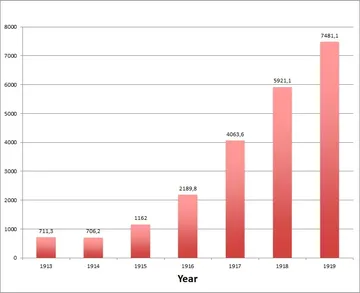
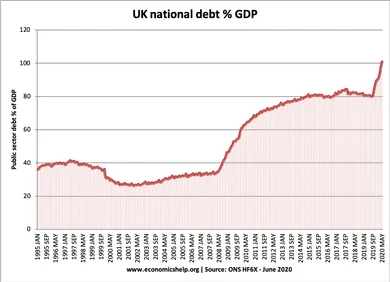
source 1 source 2
Las guerras y las crisis financieras provocan un aumento vertiginoso de la deuda (sobre todo soberana) 🚀. Este aumento de la deuda es en sí mismo inflacionario (a corto plazo) porque la oferta monetaria aumenta a través del crédito (https://www.investopedia.com/terms/c/credit-money.asp).
A largo plazo ningún prestatario puede ampliar y aumentar sus deudas infinitamente. La deuda debe bajar. Hay dos posibilidades para ello: que el prestatario incumpla y su deuda sea condonada, o que el prestatario pague su deuda (al menos parcialmente). Ambas posibilidades son deflacionarias porque la oferta monetaria disminuye.
¿Cómo se produciría la deflación?
Si en un momento determinado se produce un pánico repentino, por ejemplo, a causa de la quiebra de un banco, la burbuja de todo estallará. Esto va acompañado de un shock deflacionario / crisis crediticia / crisis del dólar / espiral deflacionaria: Debido al mayor riesgo (percibido), los tipos de interés (implícitos) aumentan, lo que incrementa la probabilidad de impago de los préstamos y reduce el valor de las acciones y los bienes inmuebles. La mayor probabilidad de impago de los préstamos y también el impago real de los mismos reducen bruscamente la oferta monetaria (= deflación). Como la oferta monetaria es ahora menor, a las empresas les resulta aún más difícil pagar sus préstamos; es decir, los tipos de interés suben aún más, con lo que la oferta monetaria cae aún más (círculo vicioso). Las personas/empresas liquidan sus acciones/inmuebles y, si pueden, devuelven sus préstamos. Esto también reduce la oferta monetaria. Para poder vender algo, las empresas tienen que reducir sus precios (=deflación). Sin la intervención de los responsables de la política monetaria charlatanes, este proceso (de curación) continuaría hasta que el coeficiente de endeudamiento sea manejable, el riesgo y, por tanto, los tipos de interés en el mercado vuelvan a ser lo suficientemente bajos como para que los empresarios estén dispuestos a pedir dinero prestado y crear empresas o contratar empleados de nuevo.
En el caso de la Gran Depresión, el Dow Jones cayó un 89%:
 fuente
fuente
Hoy en día eso es imposible, por supuesto (¿o no?). Creo que es muy poco probable debido a muchos factores (por ejemplo, la expansión de la deuda hoy no es tan mala y los mercados financieros han evolucionado).
A menudo escucho que la deuda es inflacionaria. Creo que es un error porque la deuda genera demanda de dólares. La demografía también es deflacionaria, ya que los baby boomers (la cohorte generacional más grande y más rica de la mayoría de las sociedades) se están jubilando en masa. Los jubilados consumen menos, venden sus acciones y tratan de pagar su deuda (hipoteca, etc.). Eso es deflacionario.

fuente: Fed (Sólo este gráfico es una bomba de relojería...)
Para decirlo en pocas palabras: En un plazo más corto (<5 años) espero oleadas de deflación acompañadas de quiebras de empresas y bancos. Los bancos centrales y los gobiernos tratarán de detener la deflación, pero no tendrán mucho éxito. Algunos países más pequeños y económicamente más débiles irán demasiado lejos y llevarán sus monedas a la hiperinflación. En un momento determinado del futuro (dentro de 3 a 7 años), espero que el apetito por el riesgo vuelva a aumentar y que la inflación cobre impulso.
Mi enfoque de inversión personal en este entorno macro es bastante simple:
- Mis principales posesiones son el BTC y el oro (inflación bastante larga, pero también relativamente robusta a la deflación); además, mantengo la cantidad fiat que necesito para 6 meses, 50% en USD y CHF (deflación bastante larga). Y, por supuesto, mi querido y único activo de riesgo: Hive 😍.
- Actualmente no tengo acciones porque las considero muy sobrevaloradas y espero que los beneficios de las empresas bajen mucho.
- Desde el otoño pasado, compro regularmente algunas opciones de venta sobre el S&P500, y opciones de compra sobre los bonos del tesoro estadounidense a 30 años. Esta es mi protección contra la deflación.
Más lecturas/visiones (si tienes mucho tiempo 😉 ):
Por qué el QE NO es inflacionario: https://alhambrapartners.com/2020/09/21/ok-bank-reserves-lets-do-this-one-more-time/



Espero vuestros comentarios críticos y, ojalá, opiniones controvertidas 😀 .
Pero recuerda siempre: esto es Hive y debatimos con educación y tenemos una gran cultura de debate. Esto es Hive, no Facebook.

